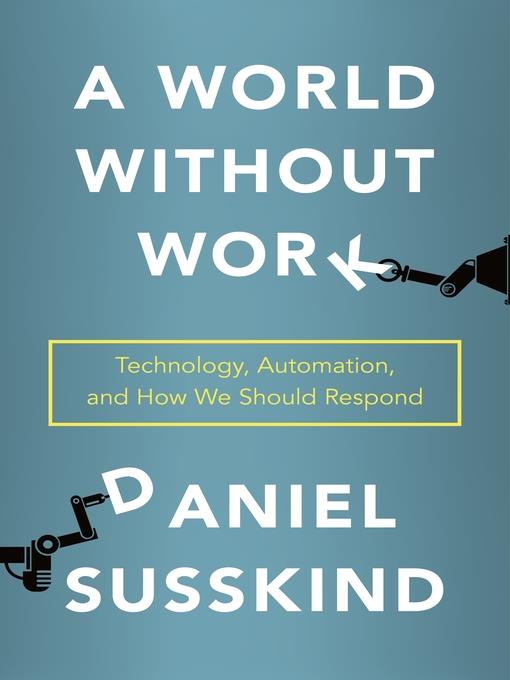
A World Without Work
Technology, Automation, and How We Should Respond
فرمت کتاب
ebook
تاریخ انتشار
2020
نویسنده
Daniel Susskindناشر
Henry Holt and Co.شابک
9781250173522
کتاب های مرتبط
- اطلاعات
- نقد و بررسی
- دیدگاه کاربران
نقد و بررسی

October 28, 2019
A thorough and sobering look at automation and the depreciation of human labor arrives from Oxford economics fellow Susskind (The Future of the Professions, coauthor). It turns on an important question: will there be enough work to employ people throughout the 21st century? Sorry but no, Susskind concludes; machines can’t do everything, but they can do much more than they’re doing currently, and will inevitably displace many more workers. He isn’t in despair, however, as he has some possible remedies in mind. Before dispensing them, he briskly covers the rise of artificial intelligence, the social problems raised by economic inequality, and the efficacy of education for protecting economically insecure workers, which he finds more limited than optimists would have people think. Susskind then posits what he believes are more effective long-term responses, including increased government intervention into the free market, targeted tax incentives for employers, and strengthened regulation aimed at changing the behavior of big technology companies. This dense but lively investigation is not for the reader who wants an easy dinner-party answer, but the curious worrier or the skeptic who wants to understand the theory behind the machines will want to take a look.

November 15, 2019
A report on how robotic automation is displacing the need for human workers. Oxford University economics fellow Susskind (co-author: The Future of the Professions: How Technology Will Transform the Work of Human Experts, 2016) spent nearly a decade researching how the rise of mechanical manufacturing, computerized production, and artificial intelligence is directly and unstoppably affecting the human workforce. He delivers a worst-case scenario in the form of an update on the economic and workforce landscape upheaval that has been in motion for decades thanks to a steep uptick in the integration of robotic production and AI. Sometimes densely academic, Susskind's pragmatic narrative is bolstered by statistical charts and graphs supporting his theories. The author diligently explains the history of these replacement technologies, the patterns they followed, and why their impacts on the giants of industry should be taken seriously. The threat of "technological unemployment" is very real, he writes, and the problems it creates will consist of increased outperformance by automated workers and a subsequent dwindling array of tasks that could be considered human-specific. Susskind also addresses the growing problem of economic inequality by way of the disparity between power-hungry, financially astute "supermanagers" (so named by economist Thomas Piketty) and stagnant workers with lower-paying jobs. Thankfully, the author doesn't deliver this grim prognosis without a proactive response or hints at how a complementary workforce fueling economic stabilization could be achieved in the long term. He posits a multitiered approach involving new skills-based education for laborers, increased regulatory control over larger technology companies, the introduction of a "robot tax," and financial incentives for employers using a sizable manual labor force. Susskind's economic perspective makes the conundrum crystal clear, and he makes a convincing and illuminating argument to decelerate the onset of global "automation anxiety." A complex yet lucid and surprisingly optimistic account from the frontlines of technology addressing the challenges facing the human workforce.
COPYRIGHT(2019) Kirkus Reviews, ALL RIGHTS RESERVED.

November 22, 2019
Susskind (economics, Balliol Coll., Oxford Univ.; coauthor, The Future of the Professions) presents strong evidence that the progress of artificial intelligence (AI) will eventually result in markedly less work, and jobs, for people, and makes a compelling case that there are few jobs that cannot eventually be performed using AI. He predicts as a result an increase in both societal wealth and unemployment. In addition, Susskind argues for "conditional basic income" (CBI) as opposed to universal basic income, which allows people to receive an income without requiring anything in return. His theory of CBI assures that those receiving the basic income make contributions to society; for example, caregiving or educating. Susskind maintains these positions are important in order to ensure that all are contributing to society, even if they do not have a paid position, and to give those without jobs a sense of meaning or purpose to their lives. VERDICT This work is sure to be controversial, but it will find an audience with those interested in public policy relating to unemployment and inequality.--Shmuel Ben-Gad, Gelman Lib., George Washington Univ., Washington, DC
Copyright 2019 Library Journal, LLC Used with permission.

December 15, 2019
The theory that there will always be jobs that humans are more adept at than machines is based on AI fueled by human input. The AlphaZero system, however, can easily teach itself, within hours, a game such as chess and how to consistently beat humans or other machines. Such bottoms-up computation doesn't solve in human terms, making the nature of the human mind irrelevant to building computers that exceed human capability. Even job fields once thought safe from automation because they rely on tacit knowledge that is hard to explain are increasingly vulnerable to AI. For a world short on paid work, Oxford economist Susskind advocates a conditional basic income to avoid inequality and provide nonworkers with ways to contribute to society. He also predicts that the worrisome power of tech companies will be political, not economic, and will merit a Political Power Oversight Authority based on moral philosophy. The lives of nonworkers may lose purpose and meaning, so governments must rethink leisure and education. Susskind's book is so timely, to miss it might be downright irresponsible.(Reprinted with permission of Booklist, copyright 2019, American Library Association.)

























دیدگاه کاربران